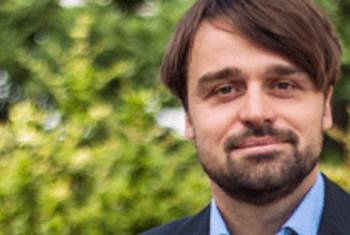Wolfgang Gaissmaier How Does Risk Perception Change over the Course of Communication Chains?
Wolfgang Gaissmaier is a Professor of Psychology at the University of Konstanz at the Department of Psychology, Social Psychology and Decision Research and an adjunct researcher at the Center for Adaptive Behavior and Cognition of the Max Planck Institute for Human Development in Berlin, Germany. His areas of interest include risk perception and communication as well as judgment and decision making. He has received the Otto Hahn Medal for outstanding scientific achievements from the Max Planck Society and the Rising Star designation from the Association of Psychological Science. In 2012, Gaissmaier was elected into the Young Academy of Sciences of Germany.
Area of Research
Judgment and Decision Making, Risk Perception and Communication
2014
Full Professor for Psychology
University of Konstanz (Universität Konstanz)
Department of Psychology, Social Psychology and Decision Research
2008
Chief Research Scientist
Max Planck Society (more details)
Max Planck Institute for Human Development
2007
2003
2013
Habilitation and Venia Legendi in Psychology
Heidelberg University (Ruprecht-Karls-Universität Heidelberg)
Thesis "Decision Making Under Risk and Uncertainty: A Cognitive-Ecological Perspective"
2007
PhD in Psychology
Free University of Berlin (Freie Universität Berlin)
Thesis "The Mnemonic Decision Maker: How Search in Memory Shapes Decision Making"
2002
Diploma in Psychology
Free University of Berlin (Freie Universität Berlin)
- Acta Psychologica
- Advances in Cognitive Psychology
- American Journal of Political Science
- Annals of Behavioral Medicine
- Annual Conference of the German Network for Evidence-Based Medicine
- Applied Cognitive Psychology
- Behavior Research Methods
- Behaviour and Information Technology
- Bundesgesundheitsblatt
- Cancer Medicine
- Cognition
- Cognitive Science
- Decision
- Deutsches Ärzteblatt
- Dutch Cancer Society
- Emotion
- European Journal of Psychological Assessment
- European Conference on Artificial Intelligence (ECAI)
- European Journal of Cognitive Psychology
- European Psychologist
- European Research Council (ERC)
- Experimental Psychology
- Frontiers in Eating Behavior
- German Research Foundation (DFG)
- Health Psychology
- Imagination, Cognition and Psychology
- International Conference on Cognitive Modeling (ICCM)
- Journal of Applied Research in Memory and Cognition
- Journal of Behavioral Decision Making
- Journal of Cognitive Psychology
- Journal of Comparative Psychology
- Journal of Experimental Psychology: Applied
- Journal of Experimental Psychology: General
- Journal of Health Psychology
- Judgment and Decision Making
- Medical Decision Making
- Memory and Cognition
- National Science Foundation (NSF)
- Organizational Behavior and Human Decision Processes
- Patient Education and Counseling
- Proceedings of the Royal Society B
- Psychological Bulletin
- Psychological Science
- Psychonomic Bulletin and Review
- Quarterly Journal of Experimental Psychology
- Review of General Psychology
- Risk Analysis
- Social Science and Medicine
- Science
- Subjective Probability, Utility, and Decision Making (SPUDM) Conference
- Technological Forecasting and Social Change
- Vaccine
- Zeitschrift für Sportpsychologie
Prizes
- Rising Star, Association for Psychological Science (2013)
- Dissertation Prize (runner up), German Psychological Society, Section: General Psychology (2009)
- Otto Hahn Medal for Outstanding Scientific Achievements, Max Planck Society (2008)
- New Investigator Award, Brunswik Society (2006)
Fellowships
- Fellow, German Young Academy (2012)
- Research Project “Adaptive Pattern Detection and Illusory Beliefs: Flipsides of the Same Coin?”. Principal Investigator (together with Nathaniel Phillips and Hansjörg Neth), Committee on Research, University of Konstanz (2014)
- Project “Effective Communication About Cancer Screening when Inviting the General Public to Participate”. Principal Investigator, German Ministry of Health (2012)
- Extension of the Funding for the Harding Center for Risk Literacy. Chief Research Scientist (together with Director Gerd Gigerenzer), Winton Capital Managment (2011)
- Project “Helping People with Low Numeracy Understand Medical Information”. Co-Principal Investigator (together with Principal Investigator Mirta Galesic and others), Foundation for Informed Medical Decision Making (2007)
 © Maximilian Dörrbecker
© Maximilian Dörrbecker
Max Planck Society
"The Max Planck Society is Germany's most successful research organization. Since its establishment in 1948, no fewer than 18 Nobel laureates have emerged from the ranks of its scientists, putting it on a par with the best and most prestigious research institutions worldwide. The more than 15,000 publications each year in internationally renowned scientific journals are proof of the outstanding research work conducted at Max Planck Institutes – and many of those articles are among the most-cited publications in the relevant field." (Source)
Institute
Max Planck Institute for Human Development
"The Max Planck Institute for Human Development is dedicated to the study of human development and education. Researchers of various disciplines – including psychology, education, sociology and medicine, as well as history, economics, computer science and mathematics – work together on interdisciplinary projects at the Berlin Institute. The research questions they examine include how people make effective decisions even under time pressure and information overload, which effects the institution of school has on students’ development and learning processes, how the interaction between behaviour and brain function changes over the lifespan, as well as how human emotions change in a historical context and how they have affected the course of history itself." (Source)
Map
Risk perception is not only an individual but also a social phenomenon. The experiment presented in this video examines the development of perceived risk over the course of a communication chain: The first person got a balanced overview on a chemical and its risks then information was passed on from person to person. WOLFGANG GAISSMAIER elaborates how this set up led to an amplification of risk perception and the distortion of facts and explains how the makeup of the group affects the final attitudes towards the risk in question.
LT Video Publication DOI: https://doi.org/10.21036/LTPUB10123
The Amplification of Risk in Experimental Diffusion Chains
- Mehdi Moussaïd, Henry Brighton and Wolfgang Gaissmaier
- Proceedings of the National Academy of Sciences (PNAS)
- Published in 2015









